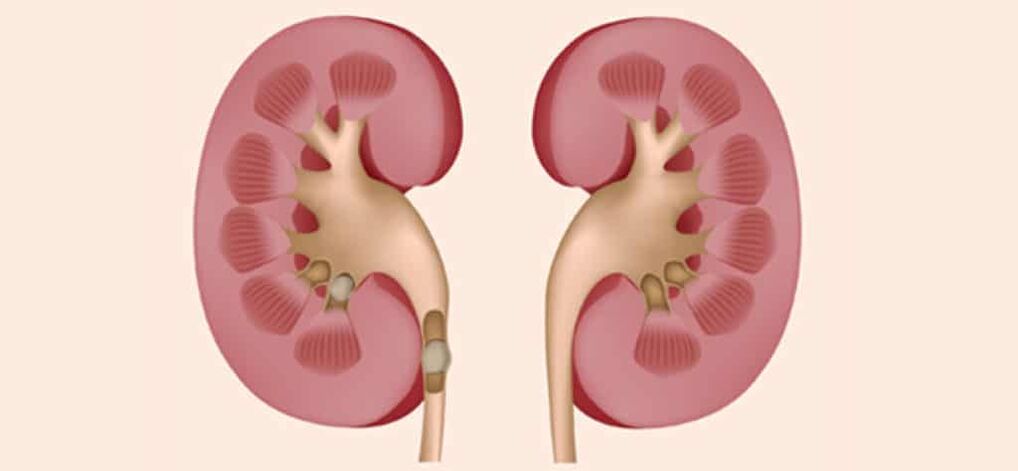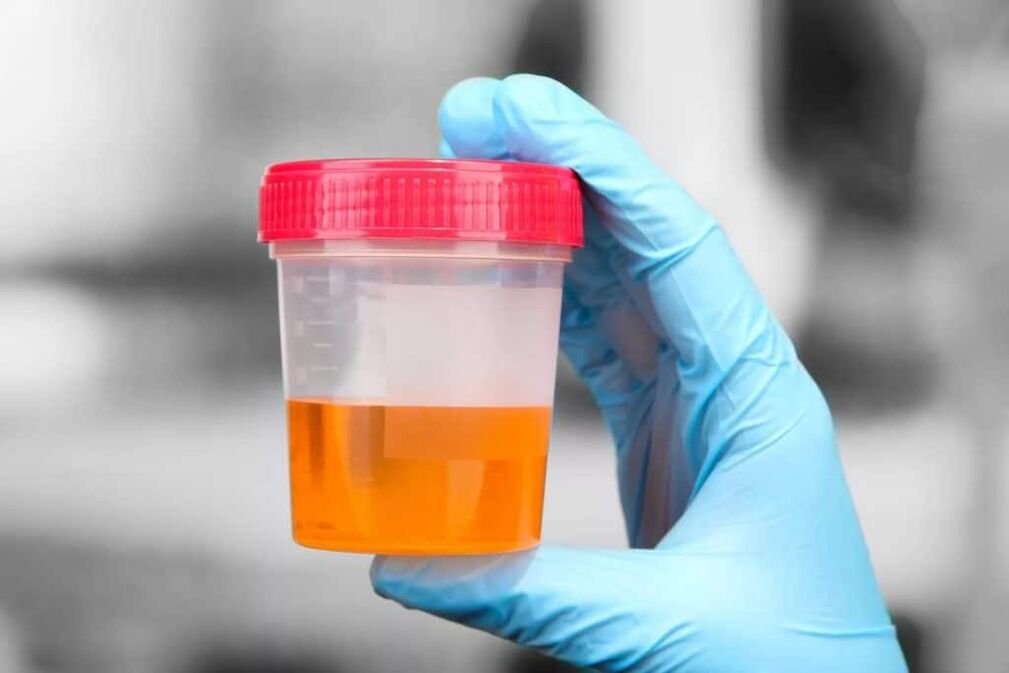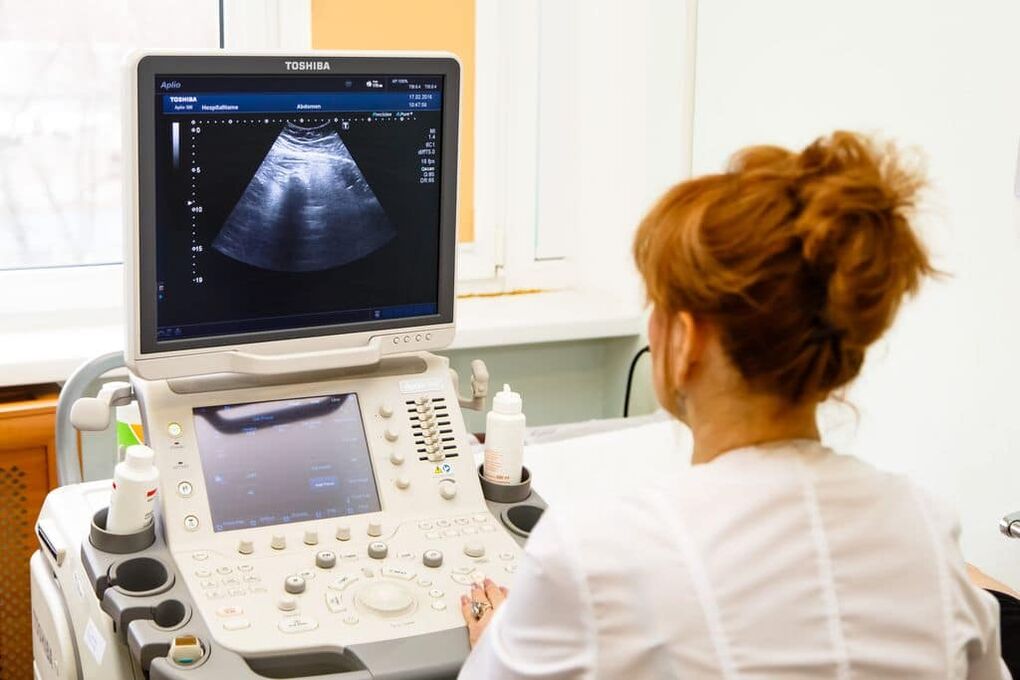Chronic prostatitis is a serious disease that occurs with periodic exacerbations that require long-term complex treatment. Inadequate therapy or lack of it leads to the development of various complications, one of which is calculous prostatitis, one of the most severe forms of the disease. Calculus prostatitis develops from indifferent congestive prostatitis and is diagnosed in men over 65 years of age.
Calculus prostatitis
Any form of prostatitis is characterized by inflammation of the prostate gland, which can occur in acute or chronic form. Calculus prostatitis is a form of inflammation caused by the presence of stones (stones) in the vessels of the prostate gland.
Chronic calculous prostatitis is a rare complex inflammation of the prostate gland. Prior to this, inadequate therapy for chronic congestive prostatitis or prostate adenoma was performed for many years.
In most cases, a complication is found in men who try to treat prostatitis independently or do not follow the recommendations of the attending physician. Compulsory discontinuation of therapy, lack of complex treatment or uncontrolled intake of drugs can lead to complications. Often, the calculated form of inflammation of the prostate gland develops against the background of accompanying pathologies of the kidneys and urinary system.
The formation of stones in the prostate gland can be due to two factors. The first of these is urolithiasis. In this case, they are talking about secondary or false stones that do not form in the prostate, but go down with the urine. This occurs against the background of a violation of the urinary system and a decrease in the tone of the prostate, which causes the reverse reflux of urine with stones.
Primary or true stones form directly in the prostate. This is due to chronic disorders of organ trophism. At the same time, salts and phosphates accumulate in the prostate, which against the background of thickening of the secretion of the gland forms dense salt deposits - stones.

Calculus prostatitis does not occur immediately. This is usually the result of not treating chronic inflammation of the prostate.
Causes of the disease
The development of calculous prostatitis is associated with long-term dysfunction of the prostate gland or concomitant diseases of the male genitalia. Factors that contribute to the development of this form of the disease may include:
- congestive prostatitis with a chronic course;
- chronic infectious prostatitis;
- BPH;
- malignant neoplasms in the body;
- urolithiasis;
- impairment of the kidneys.
The structure of the stones can be organic or inorganic, their diameter is rarely more than 4 mm. The organic structure of stones is due to the stagnation of prostate secretion, such stones are formed directly in the secretion of the prostate.
Inorganic stones enter the prostate as a result of urethro-prostatic reflux. This phenomenon is observed when the tone of the prostate gland weakens and consists of the flow of urine from the urethra to the prostate ducts. As a result, dense stones are formed in the urine, consisting of salts and phosphates excreted from the body.
Among the factors prone to the development of calculous prostatitis are lifestyle disorders against the background of chronic inflammation of the prostate. This includes unbalanced diet rich in fatty and heavy foods, lack of regular sex life.
Calculus prostatitis is diagnosed in men who have lived with chronic prostatitis for more than 10 years. In many ways, the development of this form of the disease is associated with incorrect or untimely treatment of a slow inflammatory process.

Urolithiasis calculus increases the likelihood of prostatitis.
Symptoms of the disease
The symptoms and treatment of chronic calculous prostatitis do not differ much from the symptoms of inflammation in the background of obstruction in the pelvic organs. Patient complaints include:
- frequent urination;
- feeling of heaviness in the rectum;
- pain after urination;
- weakening of potential;
- ejaculatory disorders;
- blood in urine and semen.
The presence of blood in the urine or seminal fluid allows you to suspect a calculated form of the disease before consulting a doctor. The tension of the relevant muscles causes the stones to move during instant ejaculation or urination, damaging the tissues of the prostate gland. As a result, blood is found in the urine.
As a rule, the calculous form of prostatitis is always accompanied by a violation of sexual function. This can manifest itself as capacity depletion and discharge problems. Men often complain of the impossibility of reaching the climax during intercourse.
However, in some cases, calculous prostatitis may be asymptomatic. This is observed in the formation of small stones.

A distinctive feature of this form of prostatitis is the presence of blood in the urine.
Diagnosis of the disease
Diagnosis of calculous prostatitis is based on the same tests that detect chronic inflammation.
To make a diagnosis, you must undergo the following tests:
- rectal palpation of the prostate;
- Ultrasound or TRUS;
- MRT;
- analysis of prostate secretion.
During rectal palpation of the body, the doctor clearly feels the heterogeneity of the prostate gland, which is manifested by the presence of tubercles and depressions in the body. If the stones are large, they are clearly felt on palpation. Also, in the presence of stones, prostate massage can be painful and may be accompanied by the release of blood after manipulation, which is associated with damage to the tissues of the body due to the presence of dense salt deposits.
Ultrasound or TRUS stones are characterized by increased echogenicity. Such an examination allows you to accurately assess the location, size, contours and even the structure of the stones.
In addition, ultrasound and urethrography of the kidneys may be required to rule out the secondary nature of the formation of stones in the background of diseases of the urinary system.

The presence of stones, their location and size are well determined by ultrasound.
The principle of treatment
Treatment of calculous prostatitis is a long process. Therapy aims to stop inflammation, relieve symptoms, destroy stones and prevent recurrence. As a rule, the course of treatment lasts at least a month.
Treatment of calculous prostatitis begins with symptomatic therapy based on the use of non-steroidal anti-inflammatory drugs, antibiotics and alpha-blockers. Non-steroidal anti-inflammatory drugs relieve pain and improve well-being. Antibacterial therapy is carried out only when calculous prostatitis develops against the background of infectious inflammation in the prostate gland and pathogenic microorganisms are detected during the examination. Preparations of the group of alpha-blockers are indicated for the development of urinary disorders. These drugs relax the bladder and facilitate urination.
An important role in the treatment of calculous prostatitis is given to physiotherapy aimed at improving prostate trophism. Electrophoresis, magnetotherapy, shock wave therapy are applied.
If the calculus is large, it is possible to perform surgery to remove it. Minimally invasive techniques and laser surgery are commonly used.

Medium-sized stones are successfully crushed by a laser. This procedure is performed in an outpatient setting, is completely painless and does not take more than 20 minutes. If there are several stones, the course of procedures is determined.
Prostate massage with calculus prostatitis is prohibited, as it causes damage to the tissues of the body when the stones move.
How to treat calculus prostatitis - it depends on the size of the stones and the symptoms of the disease. Treatment of small stones is carried out with the help of drugs and physiotherapy, among other things, aimed at crushing the stones. Large stones are removed surgically. The operation is performed under anesthesia.
Possible complications
Calculus prostatitis is dangerous with the risk of developing abscesses in the prostate gland. Such a complication requires immediate hospitalization and surgery, otherwise the abscess may open spontaneously, leading to the development of sepsis.
Lack of adequate and timely therapy can lead to the development of paraproctitis. The disease is characterized by inflammation of the subcutaneous tissue surrounding the rectum. Purulent inflammation can lead to dangerous consequences, up to sepsis and infection of the whole body.
One of the most common complications of calculous prostatitis in the absence of timely treatment is erectile dysfunction. Often, the presence of stones in the prostate gland leads to infertility.
The probability of complications is determined during the examination and diagnosis. In addition, in the treatment of calculous prostatitis, the patient is regularly examined by ultrasound and analysis of prostate secretion to assess the effectiveness of the selected treatment regimen.

The most common result is potential impairment.
Disease prevention
Although calculous prostatitis can be treated, the attending physician always warns of the risk of recurrence of stones. To avoid this, a man should follow some recommendations.
Prevention of recurrence of the disease is reduced to a balanced diet, regular sexual activity. It is necessary to avoid fatty and spicy foods that adversely affect the functioning of the urinary system. Remember to give up bad habits and exercise regularly to prevent blood and lymph stagnation in the pelvic organs.
Since calculous prostatitis is the most common complication of chronic prostatitis, specific prevention of the disease is reduced to timely treatment of prostatitis. You should follow your doctor's advice and not try to treat prostatitis yourself.
Often, men with this condition do not pay enough attention to the symptoms, hoping that the anxiety will go away on its own. As a result, prostatitis is untreatable and can persist for many years in a latent form, manifesting itself with periodic exacerbations. It is important to visit a doctor on time and understand that adequate therapy will eliminate the disease in a few months.
Another common mistake that leads to the development of calculus prostatitis is to stop treatment of chronic inflammation at the first improvement. As a result, the disease remains untreated and will inevitably be felt when immunity is reduced.
So, to prevent the formation of stones in the prostate gland, you need to follow a few rules:
- consult a doctor in a timely manner;
- strictly follow the instructions of a specialist;
- do not allow the disease to progress.
Every man suffering from prostatitis should be examined by a urologist every year.





































